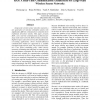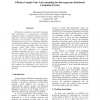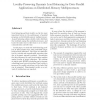16128 search results - page 80 / 3226 » Distributed network scheduling |
142
Voted
FGCS
2000
15 years 2 months ago
2000
Modern scientific computing involves organizing, moving, visualizing, and analyzing massive amounts of data from around the world, as well as employing large-scale computation. The...
172
click to vote
RTAS
2002
IEEE
15 years 7 months ago
2002
IEEE
Large-scale wireless sensor networks represent a new generation of real-time embedded systems with significantly different communication constraints from traditional networked sys...
163
click to vote
ICPADS
2006
IEEE
15 years 8 months ago
2006
IEEE
Efficient task scheduling is essential for obtaining high performance in heterogeneous distributed computing systems (or HeDCSs). Because of its key importance, several scheduling...
149
Voted
INFOCOM
2009
IEEE
15 years 9 months ago
2009
IEEE
Abstract—Network coding is emerging as a promising alternative to traditional content distribution approaches in P2P networks. By allowing information mixture in peers, it simpli...
142
Voted
JISE
2002
15 years 2 months ago
2002
Load balancing and data locality are the two most important factors in the performance of parallel programs on distributed-memory multiprocessors. A good balancing scheme should e...



